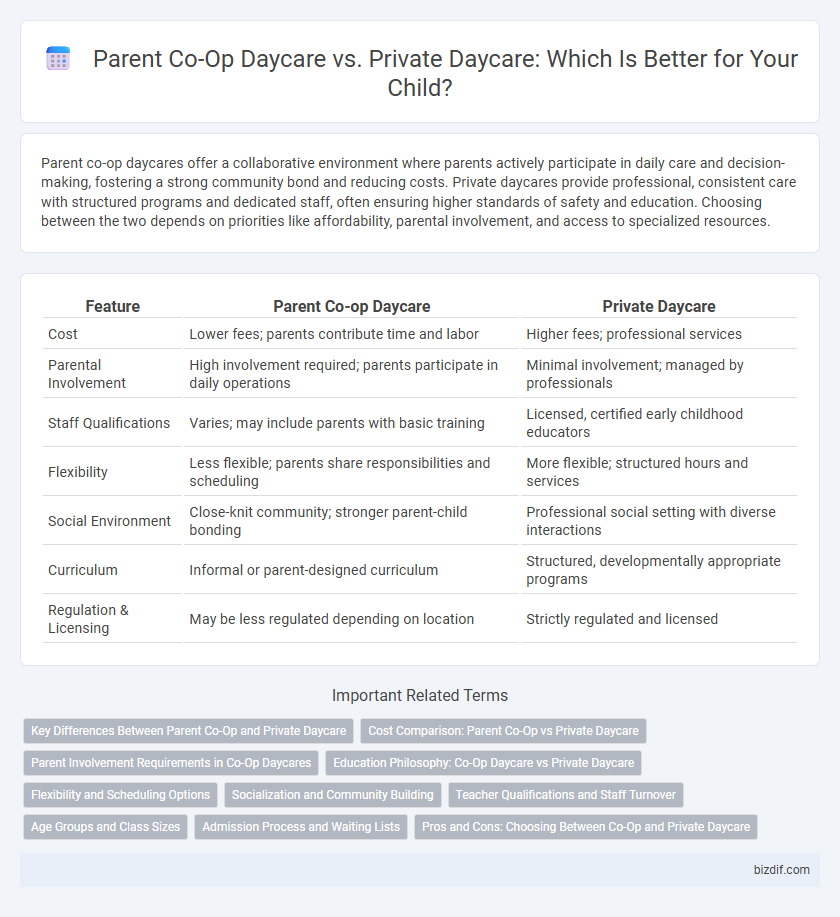Parent co-op daycares offer a collaborative environment where parents actively participate in daily care and decision-making, fostering a strong community bond and reducing costs. Private daycares provide professional, consistent care with structured programs and dedicated staff, often ensuring higher standards of safety and education. Choosing between the two depends on priorities like affordability, parental involvement, and access to specialized resources.
Table of Comparison
| Feature | Parent Co-op Daycare | Private Daycare |
|---|---|---|
| Cost | Lower fees; parents contribute time and labor | Higher fees; professional services |
| Parental Involvement | High involvement required; parents participate in daily operations | Minimal involvement; managed by professionals |
| Staff Qualifications | Varies; may include parents with basic training | Licensed, certified early childhood educators |
| Flexibility | Less flexible; parents share responsibilities and scheduling | More flexible; structured hours and services |
| Social Environment | Close-knit community; stronger parent-child bonding | Professional social setting with diverse interactions |
| Curriculum | Informal or parent-designed curriculum | Structured, developmentally appropriate programs |
| Regulation & Licensing | May be less regulated depending on location | Strictly regulated and licensed |
Key Differences Between Parent Co-Op and Private Daycare
Parent co-op daycares involve active parental participation in daily operations, fostering community engagement and typically lowering costs, while private daycares are professionally managed with standardized curriculums and flexible hours. Enrollment in parent co-ops often requires parents to contribute time for caregiving and administration, contrasting with private daycares where trained staff provide all child care services. Cost structures differ significantly, with parent co-ops being more affordable due to shared responsibilities, whereas private daycares charge higher fees reflecting staff salaries and facility expenses.
Cost Comparison: Parent Co-Op vs Private Daycare
Parent co-op daycares generally offer more affordable fees by relying on parents' volunteer work to reduce operational costs, making them a cost-effective option for families. In contrast, private daycare centers charge higher tuition to cover professional staff salaries, facility expenses, and comprehensive programming. Families seeking budget-friendly childcare often prefer parent co-ops, while private daycares attract those prioritizing convenience and specialized services despite the increased cost.
Parent Involvement Requirements in Co-Op Daycares
Parent co-op daycares require active parent involvement, including participation in daily activities, administrative tasks, and decision-making processes, fostering a strong community bond. In contrast, private daycares typically have minimal parent responsibilities, focusing on professional staff to manage all operations and child care. This participatory model in co-ops often results in lower fees but demands significant time commitment from parents.
Education Philosophy: Co-Op Daycare vs Private Daycare
Parent co-op daycares emphasize a collaborative education philosophy, encouraging active parent involvement and fostering community-based learning environments that support social development and shared responsibility. Private daycares typically implement structured educational programs designed by professionals, focusing on individualized curriculum and developmental benchmarks aligned with early childhood education standards. The co-op model prioritizes experiential learning with parental input, while private daycares offer specialized expertise and consistent professional oversight.
Flexibility and Scheduling Options
Parent co-op daycares offer greater scheduling flexibility by allowing parents to directly manage hours and participate in caregiving, adapting more easily to family needs and last-minute changes. Private daycares typically have fixed schedules with limited customization, providing consistent but less adaptable care times. Families seeking personalized flexibility often prefer co-op models, while those needing stable, predictable hours may choose private daycare options.
Socialization and Community Building
Parent co-op daycares foster strong socialization and community building by actively involving families in daily activities, creating a collaborative environment that strengthens relationships among children and parents. In contrast, private daycares primarily focus on structured socialization facilitated by professional staff, offering diverse group interactions but limited parental participation. The co-op model enhances a sense of belonging and shared responsibility, which significantly benefits children's social development and community engagement.
Teacher Qualifications and Staff Turnover
Parent co-op daycares often rely on volunteer parents with varied qualifications, resulting in less consistent teaching expertise compared to private daycares that typically hire certified early childhood educators with specialized training. Staff turnover rates in private daycares tend to be lower due to competitive salaries and professional development opportunities, while parent co-ops may experience higher turnover as participation depends on parent availability and commitment. Stability in teacher qualifications and staffing directly impacts the quality and continuity of care provided to children in daycare settings.
Age Groups and Class Sizes
Parent co-op daycares typically serve mixed-age groups ranging from infants to preschoolers, fostering peer learning and social development with smaller class sizes of about 8 to 12 children. Private daycares often have more structured age divisions such as infants (0-12 months), toddlers (1-3 years), and preschoolers (3-5 years), maintaining class sizes between 10 to 15 children to meet licensing regulations. Smaller class sizes in co-op settings enhance individualized attention, while private daycares provide age-specific curricula tailored to developmental milestones.
Admission Process and Waiting Lists
Parent co-op daycares typically have a collaborative admission process emphasizing family involvement and often require prospective parents to participate in meetings or volunteer activities, which can streamline acceptance but limit openings due to capacity. Private daycares commonly implement a formal application with fees and maintain extensive waiting lists because of higher demand and limited spots, prioritizing enrollment based on availability and sometimes offering priority for siblings. Understanding these distinct processes helps parents anticipate potential wait times and plan accordingly for their child's enrollment.
Pros and Cons: Choosing Between Co-Op and Private Daycare
Parent co-op daycare offers affordable tuition and greater parental involvement, fostering a strong community and shared responsibility in child-rearing, but requires significant time commitment and participation from families. Private daycare provides professional staff, consistent care, and structured programs, offering convenience and expert supervision, though it often comes with higher costs and less parental control. Families must weigh affordability and community engagement against expertise and convenience when choosing between co-op and private daycare options.
Parent co-op daycare vs private daycare Infographic

 bizdif.com
bizdif.com